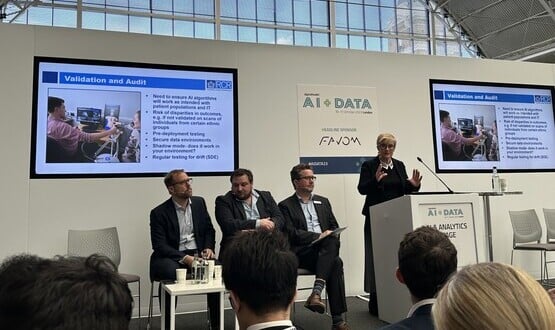“We need to proceed with caution” as AI develops says Dr Halliday
- 30 October 2023

President of The Royal College of Radiologists Dr Katherine Halliday has said that “we need to proceed with caution” as AI in healthcare develops, in a keynote session at the inaugural Digital Health AI and Data conference.
Speaking in the opening keynote session on the AI and Analytics Stage at the Business Design Centre in London, Dr Halliday spoke about the “huge attention in AI particularly in radiology” and how it is at the forefront of thinking for The Royal College of Radiologists (RCR).
She said that although AI has the “potential to increase accuracy, efficiency and improve patient outcomes” it “needs careful work to maximise benefits and avoid harms”, hence the need to “proceed with caution”.
Halliday also confirmed that the data collection phase of the RCR AI Imaging Registry – a comprehensive directory of all AI tools in NHS imaging is now underway.
With regards to barriers to implementation of AI in healthcare, challenges such as lack of evidence, IT systems, information governance, staff capacity and staff expertise, and funding were listed.
In response to an audience question on whether the ever-increasing presence of AI in healthcare are making radiologists and other clinicians feel like their jobs are less secure, Halliday responded: “I don’t think anybody in healthcare at the moment is fearing for their jobs.”
She was joined in the session by Dominic Cushnan, director of AI, imaging and deployment at NHS England, and Dr Stefan Zohren, associate professor in Engineering Science at the University of Oxford.
Cushnan highlighted the work of the NHS AI Lab, which supports health and care organisations to understand how to develop or adopt safe, effective and ethical AI technologies to improve the quality and experience of care and improve efficiency.
Data and Research Stage
The Data and Research Stage opened with a keynote session featuring Dr Richard Scott, chief medical officer, deputy CEO and from tomorrow (31 October) interim CEO at Genomics England, and Dr Claire Bloomfield, director of the Centre for Improving Data Collaboration at NHS England.
Scott, who recently spoke exclusively to Digital Health News about the work Genomics England does and how AI fits into that for an episode of Digital Health Unplugged, stressed that we need to address diversity and previous underrepresentation in genomics and healthcare in general.
Bloomfield said she hopes “in 10 years we stop talking about data infrastructure” and not have panel sessions like this one at AI and Data because by then we will not need to have the conversation about it having cracked it already.
The inaugural Digital Health AI and Data conference is taking place 30-31 October at the Business Design Centre in London.




